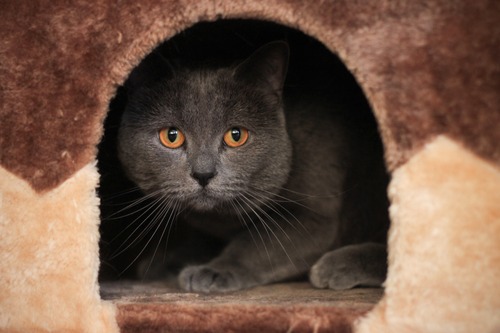Cats are known for their independent and sometimes mysterious behavior, and one of the most perplexing issues for pet owners is when their cat starts spraying. This behavior can be frustrating, but it is a form of communication rather than a sign of defiance. Typically, spraying is linked to marking territory, stress, or underlying medical concerns. Whether your cat is unneutered, experiencing anxiety, or reacting to changes in their environment, there are steps you can take to address the issue. If your cat is spraying frequently, consulting with your veterinarian at Laurel Veterinary Clinic in Broomfield, CO, can help identify any underlying causes. Call (303) 469-5363 or book an appointment online to discuss your cat’s behavior with a professional.
What Are Some Common Reasons Cats Spray?
Spraying is a natural feline behavior, but it can be an unwelcome one inside your home. If you are wondering how to stop a cat from spraying, understanding the triggers can help you implement effective solutions. Some common reasons for cat spraying include:
Marking Their Territory
Cats are territorial animals, and spraying is one of the primary ways they claim an area as their own. This behavior is more common in multi-cat households, where competition for space and resources can lead to marking behaviors. Even outdoor cats passing by a window can trigger an indoor cat to start spraying as a territorial response.
Stress and Anxiety
Changes in a cat’s environment, such as moving to a new home, introducing a new pet, or even rearranging furniture, can cause stress. When a cat feels insecure, they may start spraying to create a sense of familiarity in their space. If your cat has recently experienced a major change, providing additional comfort and stability can help reduce stress-related spraying.
Unneutered Cats and Hormonal Influences
One of the most common reasons for cat spraying is related to hormones. Unneutered male cats are especially prone to spraying to attract mates and establish dominance. Female cats can also spray when they are in heat. Spaying or neutering your cat significantly reduces the likelihood of this behavior, and in many cases, it completely stops spraying.
Medical Conditions
While spraying is often behavioral, it can also be a sign of a medical issue. Urinary tract infections, bladder stones, and other health concerns can cause discomfort, leading a cat to spray outside the litter box. If your cat is spraying frequently or showing other unusual bathroom behaviors, a veterinary check-up is recommended to rule out health problems.
How To Stop a Cat From Spraying
Once you understand why your cat is spraying, you can take steps to address the behavior. There are several effective strategies for reducing and stopping spraying altogether.
Spay or Neuter Your Cat
If your cat is not already spayed or neutered, scheduling this procedure is one of the most effective ways to stop spraying. The majority of spraying behaviors are hormone-driven, and sterilization significantly decreases the urge to mark territory. Most cats stop spraying within weeks of being neutered or spayed, though it may take time for hormone levels to balance out.
Provide a Stress-Free Environment
Since stress is a major contributor to spraying, creating a calm and stable environment can help prevent this behavior. Some ways to reduce stress for your cat include:
- Providing plenty of vertical and horizontal space with cat trees and shelves
- Using pheromone diffusers such as Feliway to create a calming atmosphere
- Establishing a consistent daily routine with feeding and playtimes
- Offering plenty of hiding spots and escape routes in multi-pet households
Cats thrive in environments that feel safe and predictable. Reducing stressors in their surroundings can significantly help in stopping unwanted spraying.
Clean Marked Areas Thoroughly
When a cat sprays, the scent left behind can encourage repeat behavior. Using an enzymatic cleaner designed for pet odors is crucial to removing pheromone traces completely. Avoid using ammonia-based cleaners, as the smell can resemble urine and may encourage your cat to spray again. Cleaning thoroughly can help break the cycle of spraying in the same spots.
Address Conflicts in Multi-Cat Households
If you have multiple cats, conflicts over resources can lead to increased spraying. To reduce competition:
- Ensure each cat has their own food and water bowls, litter box, and resting areas
- Provide multiple litter boxes in different locations
- Give each cat equal attention and playtime to prevent jealousy
- Watch for signs of bullying or aggression between cats and intervene when necessary
Knowing When to Seek Veterinary Help
If your cat continues to spray despite trying these methods, it may be time to consult with your veterinarian. A professional can assess whether the spraying is caused by medical issues, anxiety, or a deeper behavioral concern. In some cases, behavioral therapy or medication may be necessary to manage persistent spraying. At Laurel Veterinary Clinic, our team can provide guidance and support to help you manage your cat’s spraying issues. Contact us to discuss the best course of action for your pet.
Finding Long-Term Solutions for Your Cat
Stopping a cat from spraying requires patience and a thorough understanding of the reasons behind the behavior. Whether your cat is reacting to stress, territorial instincts, or hormonal influences, addressing the root cause is essential. By implementing strategies like neutering, reducing household stress, and thoroughly cleaning marked areas, you can help your cat feel more secure and eliminate unwanted spraying. If you are struggling with persistent spraying, don’t hesitate to reach out to Laurel Veterinary Clinic for expert advice and support. Call (303) 469-5363 or book an appointment online today to get your cat the help they need.





